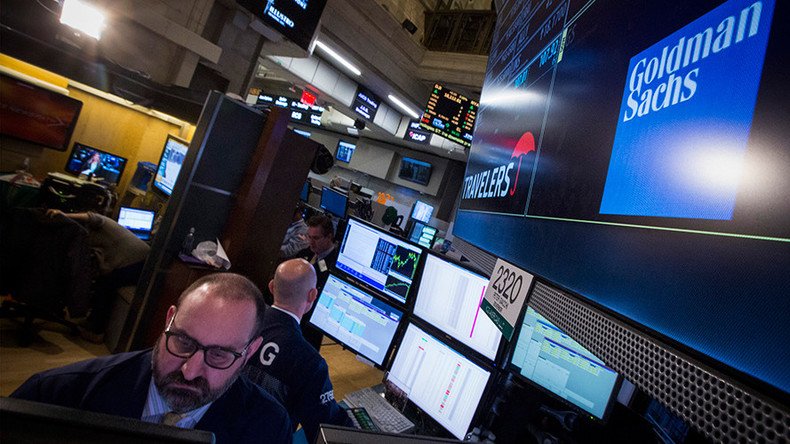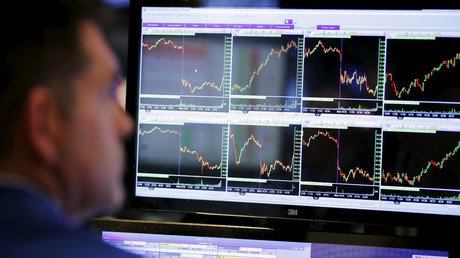Goldman Sachs sends US into recession, promptly retracts report’s slide

Despite being “too big to fail”, America’s “most important bank” Goldman Sachs may have done so this week, at least for a few minutes, when it possibly tipped off a new economic recession.
A slide in the “Markets do not ‘Take it Easy’ to start the year” report posted online showed the US in a recession according to Goldman’s Current Activity Indicator.
“Although EM assets remain in the cross-hairs – and the outlook there remains tenuous in spots – growth concerns have impacted the market’s view of US and European growth as well, pushing our market-based measure of US growth risk to new post GFC lows (see Exhibit 8),” the report read.
Oops from GS pic.twitter.com/jz0LCculCQ
— zerohedge (@zerohedge) January 20, 2016Shortly after the financial watchdog website Zero Hedge tweeted their response, Goldman Sachs posted an altered slide, moving the dark blue line from zero to closer to two.
Goldman Sends Out Chart Showing U.S. In Recession, Promptly Retracts It https://t.co/kqRrIZPDvWpic.twitter.com/ckKIPGK403
— zerohedge (@zerohedge) January 20, 2016@zerohedge They mixed the internal and muppet versions.
— Dick Darlington (@Darlington_Dick) January 20, 2016@zerohedge@Sebastian_JKT Maybe they can get the guys at NOAA to show them how to falsify data.
— Kendrick Melville (@KendrickMelvill) January 21, 2016@zerohedge@stevebartin Who called them; the Fed or the U.S. Govt? No one is allowed to tell the truth about the economy.
— dogbert88 (@dogbert88) January 20, 2016So if Goldman Sachs changed the chart, there’s no recession, right?
Well, that’s where we get into a gray area.
Economist Paul Samuelson once said “the stock market has predicted nine out of the last five recessions”, according to the Washington Post, which asked “Is the stock market telling us we’re headed for a recession?” on Wednesday.
Andrew Levin, a Dartmouth professor and former adviser to Federal Reserve Chair Janet Yellen, pointed out in this document posted Monday that the “jobs boom doesn't look like it will last” and “industrial production is falling as fast as it does when there's historically been a recession”, according to the Washington Post.
Art Cashin, Director of Floor Operations at UBS, told CNBC Tuesday: "If corporations start to pull back and say 'I don't want to advance anything; I don't want to hire anybody,' we could slide into a recession."
Former Treasury Secretary Larry Summers, who’s been spinning through the revolving door between Washington and Wall Street since the Clinton administration, wrote in the Financial Times earlier this month that “markets understood the gravity of the 2008 crisis well before the Federal Reserve” and cited a report by The Economist which found the International Monetary Fund (IMF) failed to recognize any of the 220 recessions in major countries in the April before the recession started.
Last week, portfolio strategist Michael Pento wrote in his CNBC commentary ominously titled “A recession worse than 2008 is coming”: “The unscrupulous individuals that dominate financial institutions and governments seldom predict a down-tick on Wall Street, so don't expect them to warn of the impending global recession and market mayhem. But a recession has occurred in the US about every five years, on average, since the end of WWII; and it has been seven years since the last one - we are overdue.”
Goldman Sachs has long been criticized, but rarely punished, for its role in the global financial crash, aka GFC.
As portrayed in the new Oscar-nominated film “The Big Short,” the $40 billion company sold investments they knew to be "crap" and "junk," and took out insurance policies against them.
“Investment banks such as Goldman Sachs were not simply market-makers, they were self-interested promoters of risky and complicated financial schemes that helped trigger the crisis”, Michigan Democrat Carl Levin from the Senate Permanent Subcommittee on Investigations said.
Despite multiple revelations published by the Subcommittee, the Obama administration announced it was ending the investigation into Goldman Sachs for its manipulation of the sub-prime mortgage market in 2012.
Ironically, Republican presidential candidate and Texas Senator Ted Cruz loves nothing more than telling Republicans how Obama brought the country to its knees, failing to mention that his wife is a managing director for Goldman Sachs and regional head of the bank’s Houston office.
The government has been able to squeeze a few bob out of Goldman Sachs. Last week, it settled a joint lawsuit for $5 billion, specifically for Goldman Sachs’ role in selling mortgage-backed securities between 2005 and 2007.
It reached a $1.2 billion settlement with the Federal Housing Finance Agency in 2014 and in 2010, Goldman Sachs paid $550 million to the Securities Exchange Commission.
In all cases, the settlements allowed them to avoid prosecution or jail time.













